
Free For All
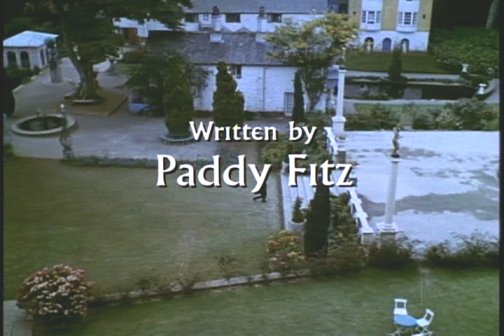
The first thing we notice about this episode is that it was written by Paddy Fitz, the name being a nom de plume for Patrick McGoohan.
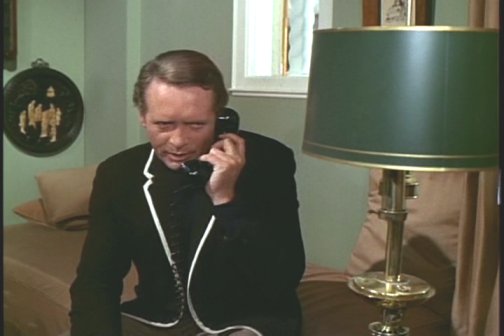
The show opens with the Prisoner receiving a telephone cal for Number Six. He will only acknowledge that six is the number of the cottage, showing early his defiance of the Village. Number Two comes on the phone and asks the Prisoner if he has any complaints, to which the following reply is made:
Prisoner: Yes. I'd like to mind my own business.
Number Two: So would we.
Number Two is quickly establishing that whatever the Prisoner does is the business of the Village. There is no freedom in the Village, not even freedom of the mind.
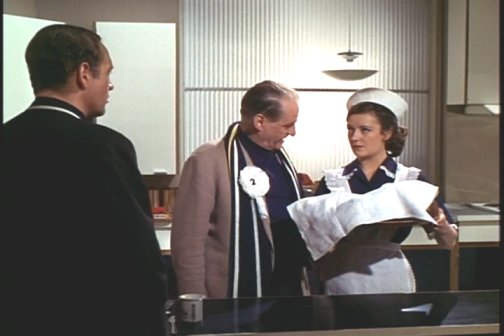
The Prisoner is then introduced to a girl, Number 58, who speaks an odd, apparently foreign language. Number Two tells the Prisoner that it is the start of their election campaign, and asks if he intends to run for office; namely, the office of Number Two.
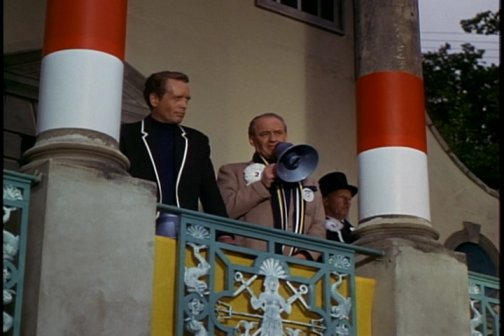
Outside, a demonstration supporting Number Two commences, complete with marchers, music, and a Village buggy with an election poster. Number Two and the Prisoner then go out, and Number Two begins to address the crowd. The people have been chanting "Number Two, Number Two" and other empty-headed phrases. As Number Two talks to them, they support everything he says. then, Number Two introduces the Prisoner.
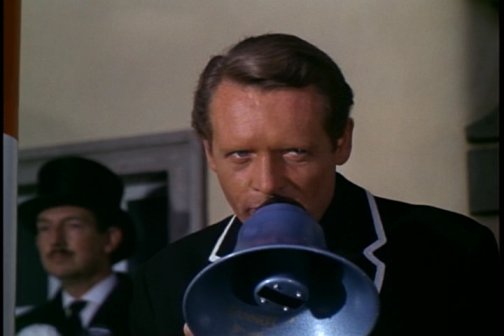
The Prisoner opens by saying he is not a number , he is a person, which brings a stunned silence, broken by the popping of a balloon and a round of laughter. The Prisoner continues, telling them they were all brought to the Village to have "knowledge protected or extracted," and he is greeted by cheers. The cheers end, though, when he continues and says:
Prisoner: "Unlike me, many of you have accepted the situation of your imprisonment and will die here like rotten cabbages."
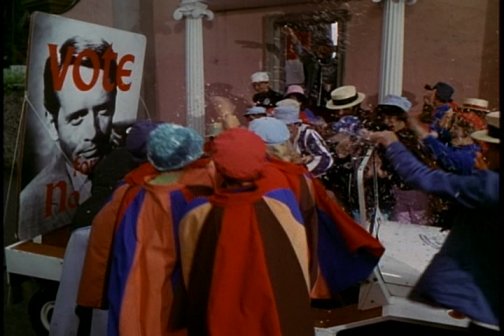
Number Two encourages the Prisoner to continue. The Prisoner says he wants to find out who are the Keepers, and who are the prisoners. He then announces he will run for the office of Number Two, and the current Number Two leads the crowd in a round of applause.Blank placards that were in the group turn around and reveal a photograph of the Prisoner, and the "Vote fo No. 6" logo, another example of how things can happen in the Village without any warning.
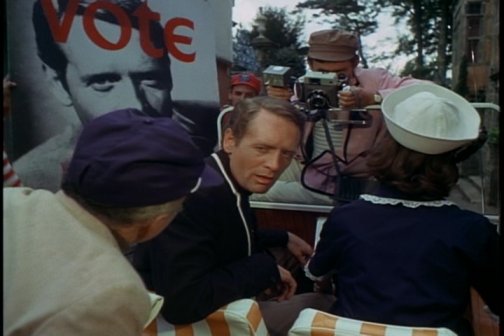
The Prisoner is then offered transport for the election, with the foreign-speaking woman as his driver. The Prisoner is on the way to the Town Hall for a meeting when two reporters catch up to his buggy and begin asking questions. One asks the Prisoner how he intends to handle his campaign, and the Prisoner replies "No comment," to which the reporter records "intends to fight for freedom at all costs."
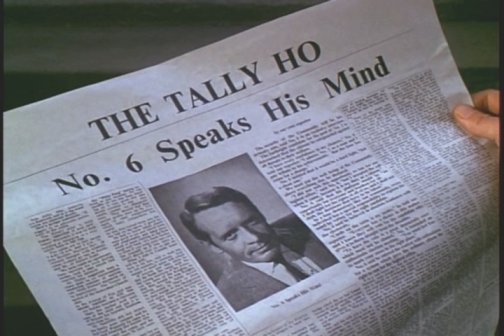
The questions continue, each time the Prisoner answering with a "No comment," each time the reporter writing down whatever he wishes. Within a very few minutes the Prisoner receives an election edition of the Tally Ho, complete with his photograph and the complete reporter's interview. The Prisoner then gets to the Town Hall, enters, and goes to the chamber where the out-going Council is meeting.
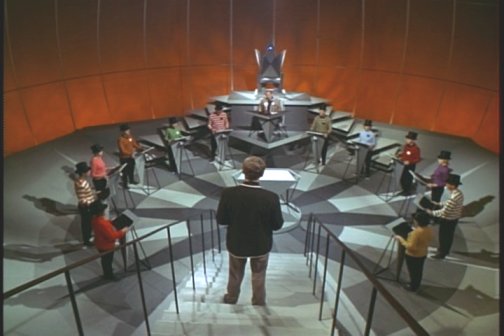
The Prisoner is given a chance to question the members of the council, which proves his undoing. He asks them whose side they are on, and is cautioned by Number Two not to get "too personal." The Prisoner then calls the council a farce, a "twentieth century Bastille that's supposed to be a pocket Democracy." He continues, calling them imbeciles. Finally he concludes:
"In your heads are the remnants of a brain. In the middle of your bodies you have guts. In your hearts you may still have the desire to be human beings again.
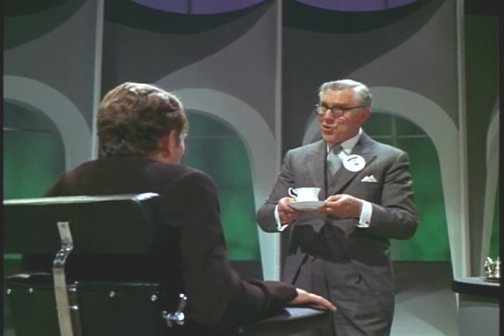
Number Two presses a button and the counselors are brought instantly to toe, and Number Six is surrounded by a paralyzing light. He is told he will have to undergo "The Test." In this attempt to break him, the Prisoner refuses sugar in his tea, and is told that he was ordered by a doctor to give up the sugar years ago. He is then told that he is afraid of death, to which he replies that he is afraid of nothing. The Village representative replies "You are afraid of yourself." The Prisoner does not reply to that.
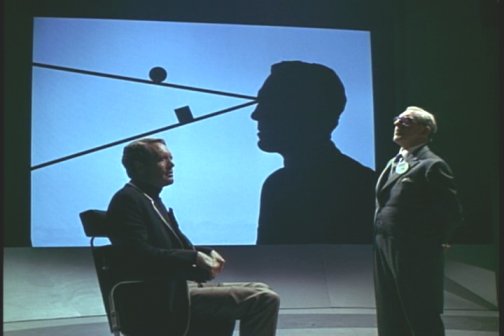
The manager of the session then subjects the Prisoner to a "truth test" in which he questions him about his motivations for running for office. It is apparent that the lights and possibly other devices are being used on the Prisoner to brainwash him as the circle and the square finally merge into one. This is interesting especially in relation to Arrival, where the Prisoner pounded a square peg into a round hole, showing his total defiance of the system.
It appears at first that the brainwashing has been successful, as he is confronted by more reporters and this time gives "acceptable" answers. He even tells the girl working for him "Obey the rules and we will look after you."
Suddenly he seems to react violently, as he rushes out and goes through the Village then out to the surrounding area. He manages to steal a boat and makes an escape attempt in it, but is stopped by rover. He apparently is brought back under control, and continues to engage in speech making and other election activities. He campaigns with a megaphone, apparently now having fully given in to the brainwashing effort.
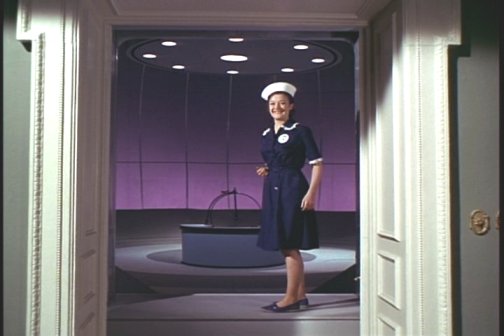
Once again, though, the Prisoner seems to come out of the control, but seems to slip back into the controlled state. He is drugged further, enough to last through the election. The election is held, Number Six wins, and the old Number Two pins a Number Two badge on the Pilsner. He is shown Number Two's chambers and the controls and the defeated Number Two leaves, leaving the Prisoner alone with his female taxi driver.
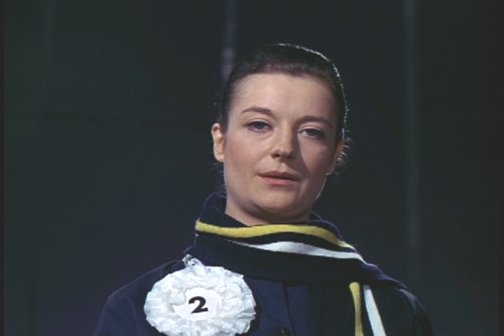
Suddenly it seems that the Prisoner has gone into a trance, and the woman slaps him until he wakes, then frantically runs around pushing buttons and announces that he will immobilize all electronic controls, and that everyone is free to go. Unfortunately for the Prisoner, the controls have already been dealt with and his actions have caused nothing actual to happen. In the end, he is "persuaded" to leave the office and he finds out that the woman is really the new Number Two.
The episode is a beautiful commentary on the way in which we elect our officials to govern us, along with the way elections are covered by the media.
The reporters, for example, are not at all interested in what the Prisoner is saying. They record what they want him to say, and report that in the newspapers. We have seen very much the same in our own presidential elections, where reporters will deal with trivialities rather than issues of major importance. Rumor is often presented as fact and things presented as facts often turn out later not to be factual at all. Good solid journalism with good research on the part of the reporters ha become a thing of the past, and we need to be very careful about everything we read or see on the TV, accepting nothing at face value. We need to consider the motives of the people presenting the infreeation.
So it's an interesting episode with warnings that are just as relevant, perhaps even more so, today then when it was originally made.
Main index page
Main Prisoner index page
|